第三单元短语、词汇、句型知识点梳理
人教版九年级英语第三单元重点短语及句型知识点小结

人教版九年级英语第三单元重点短语及句型知识点小结Unit 3 could you please tell me where the restrooms are?一.重点短语1. turn left/right 向左/右转2. on one’ s left/right 在某人的左/右边3. go along Main Street 沿着主大街走4. have dinner 吃饭5.go to the third floor 去三楼6. a room for resting 休息室7. be special about.. . 有……独特之处8. pardon me 请再说一次9. come on 过来;加油10. one one’ s way to... 在去.......的路上11. something to eat一些吃的东西12. hold one’ s hand 抓住某人的手13. mail(send) a letter 寄信14. pass by 路过15. a rock band 摇滚乐队16. in the shopping center 在购物中心17. in some situations 在某些场合18. park one’ s car 停车19. an underground parking lot地下停车库20. such as 例如21. thank sb. for doing sth. 为…感谢某人22. look forward to…期盼…23. meet sb. for the first time 第一次见到某人24. in a rush to do sth. 仓促地做某事25. be convenient to do sth. 做某事很方便二.重点句型1. not…until…You never know until you try something.2. It seems (that)…It seems a rock band plays there every evening.3. do you know...例:Excuse me, do you know where I can buy some medicine?Do you know when the bookstore closes today?4. Could you please tell me... ?Could you please tell me how to get to the post office?5.sb. suggest+ 从句(虚拟语气:should+V )例:The clerk suggests they go to the museum.6.take的用法① take some food take some medicine (=have吃,喝)① take notes做笔记① take one’s temperature ( 测量)① It takes sb some time/money to do something (花费,需要)① I’ll take this coat.(=buy购买)① take somebody / something to (带领,拿去,取)①take a train to Chongqing (乘坐)① take off(脱下)2.turn 的用法turn to page 80 翻到It is your turn.轮到你了。
九年级上册笔记英语第三单元
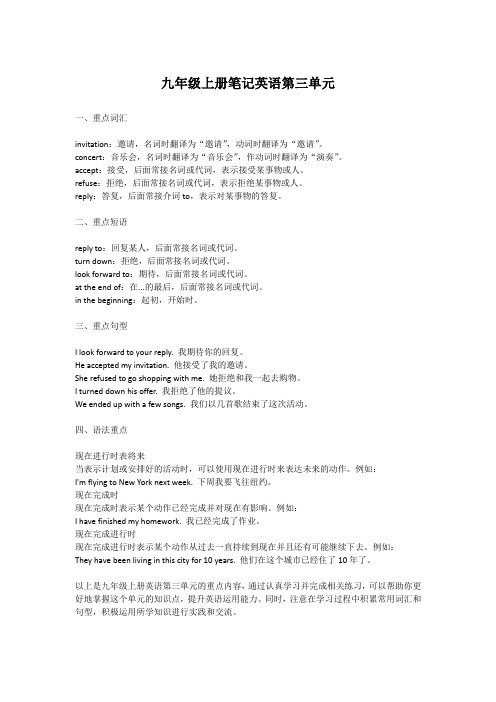
九年级上册笔记英语第三单元一、重点词汇invitation:邀请,名词时翻译为“邀请”,动词时翻译为“邀请”。
concert:音乐会,名词时翻译为“音乐会”,作动词时翻译为“演奏”。
accept:接受,后面常接名词或代词,表示接受某事物或人。
refuse:拒绝,后面常接名词或代词,表示拒绝某事物或人。
reply:答复,后面常接介词to,表示对某事物的答复。
二、重点短语reply to:回复某人,后面常接名词或代词。
turn down:拒绝,后面常接名词或代词。
look forward to:期待,后面常接名词或代词。
at the end of:在...的最后,后面常接名词或代词。
in the beginning:起初,开始时。
三、重点句型I look forward to your reply. 我期待你的回复。
He accepted my invitation. 他接受了我的邀请。
She refused to go shopping with me. 她拒绝和我一起去购物。
I turned down his offer. 我拒绝了他的提议。
We ended up with a few songs. 我们以几首歌结束了这次活动。
四、语法重点现在进行时表将来当表示计划或安排好的活动时,可以使用现在进行时来表达未来的动作。
例如:I'm flying to New York next week. 下周我要飞往纽约。
现在完成时现在完成时表示某个动作已经完成并对现在有影响。
例如:I have finished my homework. 我已经完成了作业。
现在完成进行时现在完成进行时表示某个动作从过去一直持续到现在并且还有可能继续下去。
例如:They have been living in this city for 10 years. 他们在这个城市已经住了10年了。
以上是九年级上册英语第三单元的重点内容,通过认真学习并完成相关练习,可以帮助你更好地掌握这个单元的知识点,提升英语运用能力。
六年级上册英语素材资料 第三单元短语、词汇、句型知识点梳理 译林版(三起)

Unit3 短语、词汇、知识点梳理一、第三单元短语1.节日快乐holiday fun2.回到学校come back to school3.国庆假日之后after the National Day holiday4.放假你去了哪儿?Where did you go for the holiday?5.打电话给你call you6.在家at home7.去上海go to Shanghai8.拜访我的阿姨visit my aunt9.去外滩go to the Bund10.参观上海博物馆visit the Shanghai Museum11.看见许多有趣的事see many interesting things12.你的假日怎么样?How was your holiday?13.有趣的事great fun14.我们的家人our family15.去农场go to a farm16.在星星湖边near Star Lake17.摘了一些橘子pick some oranges18.去钓鱼go fishing19.钓了一条大鱼catch a big fish20.想要把鱼给你want to give you the fish21.长城Great Wall22.故宫Palace Museum23.颐和园Summer Palace24.天安门广场Tian’anmen Square 25.谈论你的旅游经历talk about your travel experiences26.为我摘只橘子pick an orange for me27.想要树上的一只橘子want an orange from the tree28.想要海里的一条鱼want a fish from the sea29.三个主要的学校假日three main school holidays30.在英国in the UK31.复活节假期the Easter holiday32.暑假the summer holiday33.圣诞假期the Christmas holiday34.该吃晚饭了。
高一必修三英语unit3知识点
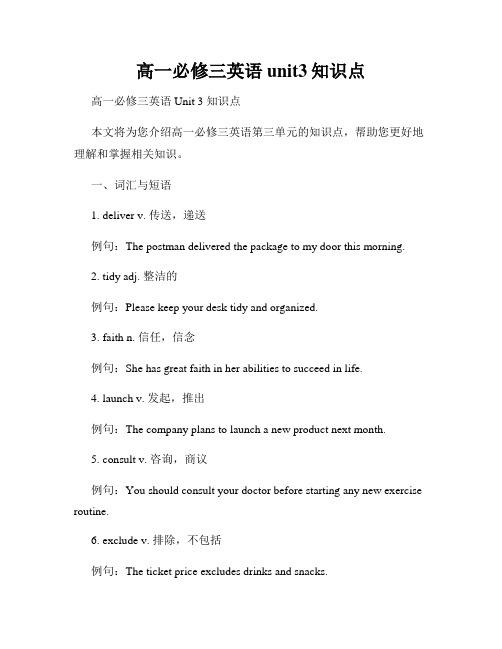
高一必修三英语unit3知识点高一必修三英语Unit 3 知识点本文将为您介绍高一必修三英语第三单元的知识点,帮助您更好地理解和掌握相关知识。
一、词汇与短语1. deliver v. 传送,递送例句:The postman delivered the package to my door this morning.2. tidy adj. 整洁的例句:Please keep your desk tidy and organized.3. faith n. 信任,信念例句:She has great faith in her abilities to succeed in life.4. launch v. 发起,推出例句:The company plans to launch a new product next month.5. consult v. 咨询,商议例句:You should consult your doctor before starting any new exercise routine.6. exclude v. 排除,不包括例句:The ticket price excludes drinks and snacks.7. accompany v. 陪同,伴随例句:I'll accompany you to the airport so that you won't get lost.8. focus n. 焦点,重点例句:The meeting's focus will be on the company's future expansion plans.9. transfer v. 转移,调动例句:He was transferred to the company's branch office in New York.10. obtain v. 获得,得到例句:You can obtain a copy of the report from the receptionist.二、语法知识1. 动词的时态和语态英语动词有多种时态和语态,如一般现在时、一般过去时、现在进行时、过去进行时、一般将来时、被动语态等。
外研版九年级英语上册 Module 3 重点难点易错点整理
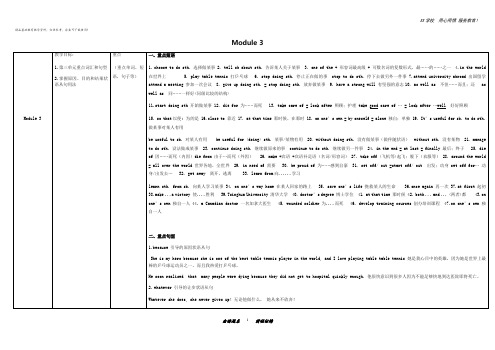
二、目的状语从句
用来补充说明主句中谓语动词发生的目的的状语从句。
(1)目的状语从句通常由so that, in order that(为了,以便)引导。例如:
We started early so that we could catch the first train.
8. We are not sureif it ______ tomorrow. If it _______, our sports meeting will be put off.
A. will rain; rainsB. rains; will rainC. will rain; will rain
(3)as语气比since弱,表示附带说明的双方已知的原因,含有对比说明的意味。
As he has no car, he can’t get there easily.
(4)for引导的,不说明主句行为发生的直接原因,只提供一些辅助性的补充说明,并且只能放于主句之后.
We must start early tomorrow, for we have a long way to go.
—he is very friendly and kind to us.
A. BecauseB. WhenC. ButD.since
7. Mary always tells lies.she says, nobody will believe her.
A. WhateverB. WheneverC. WhereverD. However
9.Sheworkedhard on English _____shecaughtup with my classmatesfinally.
七年级英语下册第三单元unit3知识点
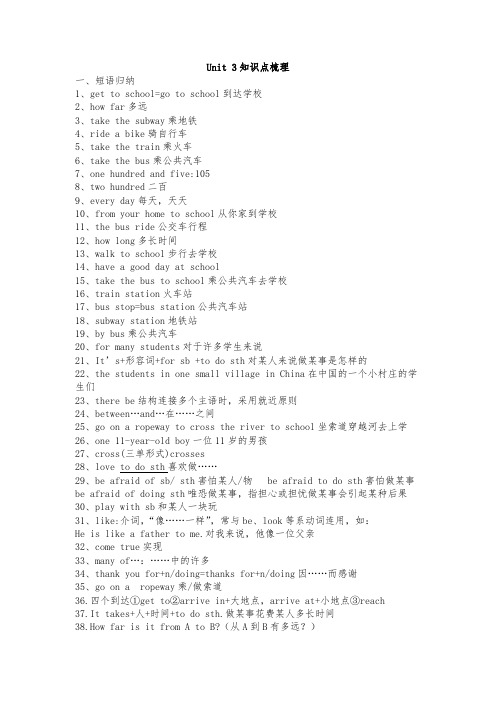
Unit 3知识点梳理一、短语归纳1、get to school=go to school到达学校2、how far多远3、take the subway乘地铁4、ride a bike骑自行车5、take the train乘火车6、take the bus乘公共汽车7、one hundred and five:1058、two hundred二百9、every day每天,天天10、from your home to school从你家到学校11、the bus ride公交车行程12、how long多长时间13、walk to school步行去学校14、have a good day at school15、take the bus to school乘公共汽车去学校16、train station火车站17、bus stop=bus station公共汽车站18、subway station地铁站19、by bus乘公共汽车20、for many students对于许多学生来说21、It’s+形容词+for sb +to do sth对某人来说做某事是怎样的22、the students in one small village in China在中国的一个小村庄的学生们23、there be结构连接多个主语时,采用就近原则24、between…and…在……之间25、go on a ropeway to cross the river to school坐索道穿越河去上学26、one 11-year-old boy一位11岁的男孩27、cross(三单形式)crosses28、love to do sth喜欢做……29、be afraid of sb/ sth害怕某人/物 be afraid to do sth害怕做某事be afraid of doing sth唯恐做某事,指担心或担忧做某事会引起某种后果30、play with sb和某人一块玩31、like:介词,“像……一样”,常与be、look等系动词连用,如:He is like a father to me.对我来说,他像一位父亲32、come true实现33、many of…:……中的许多34、thank you for+n/doing=thanks for+n/doing因……而感谢35、go on a ropeway乘/做索道36.四个到达①get to②arrive in+大地点,arrive at+小地点③reach37.It takes+人+时间+to do sth.做某事花费某人多长时间38.How far is it from A to B?(从A到B有多远?)39.4个花费①take主语为it,花费时间,句型为It takes+人+时间+to do sth.做某事花费某人多长时间②spend主语为人,既花费时间,又花费金钱。
unit3-holiday-fun知识点梳理
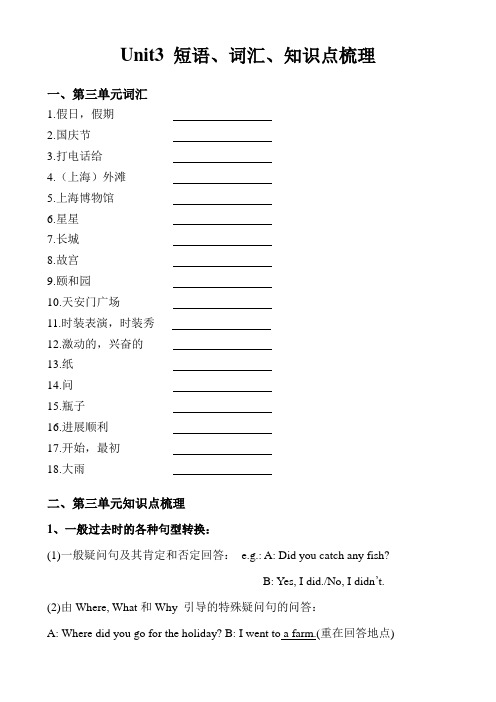
Unit3 短语、词汇、知识点梳理一、第三单元词汇1.假日,假期2.国庆节3.打电话给4.(上海)外滩5.上海博物馆6.星星7.长城8.故宫9.颐和园10.天安门广场11.时装表演,时装秀12.激动的,兴奋的13.纸14.问15.瓶子16.进展顺利17.开始,最初18.大雨二、第三单元知识点梳理1、一般过去时的各种句型转换:(1)一般疑问句及其肯定和否定回答:e.g.: A: Did you catch any fish?B: Yes, I did./No, I didn’t.(2)由Where, What和Why 引导的特殊疑问句的问答:A: Where did you go for the holiday? B: I went to a farm.(重在回答地点)A: What did you do for the holiday? B:I visited the Shanghai Museum.(重在事情。
) A:Why did you call me? B: Because I wanted to give you the fish. (重在陈述原因。
) 针对上述的三种句型的回答,也可以采用逆向的对画线部分提问:a : I called you because I wanted to give you the fish?(对画线部分提问)(3)由How引导的特殊疑问句的问答:A:How was your holiday? B: It was great fun.2、the的用法:本单元重在讲述travel experiences(旅游经历),旅游景点都是唯一的,作为唯一性的名词前均须加上the。
如:the Bund, the Shanghai Museum, the Great Wall, the Palace Museum, the Summer Palace, the Tian’anmen Square.3、excited 后接不同介词的意思对比:be excited by 被……而激动;be excited for 因/为……而激动;be excited at 与be excited about常互用,后+v-ing. )4、有关动词过去式的变化:不规则动词有:(前一单元出现过的不再重复。
六年级英语上册第三单元的必背知识点

六年级英语上册第三单元的必背知识点一、重点单词和短语名词:film(电影)、trip(旅行)、supermarket(超市)、evening(晚上,傍晚)、tonight(今晚)、tomorrow(明天)、next week(下周)、dictionary(字典)、comic book(连环画册)、word book(单词本)、postcard(明信片)、lesson(课)、space(太空)、moon(月亮)、half(一半)、price(价格)、mooncake(月饼)、poem(诗)等。
动词:visit(拜访)、see a film(看电影)、take a trip(去旅行)、learn(学习)、teach(教)、disturb(打扰)、jump in (跳进)、remember(记住)、travel(尤指长途旅行)、share sth. with sb.(和某人分享某物)等。
形容词:comic(滑稽的)。
副词:without(没有)、together(一起)。
短语:make a snowman(堆雪人)、lots of = a lot of(许多)、get together(聚会)、Mid-Autumn Festival(中秋节)等。
二、重点句型1. 询问计划:What are you going to do tomorrow?(你明天打算做什么?)I’m going to have an art lesson.(我打算上美术课。
)举一反三:What is he going to do?(他打算做什么?)He is going to climb mountains.(他打算爬山。
)2. 询问时间和地点:When are you going?(你们什么时候去?)Next Monday.(下周一。
)Where are we going?(我们打算去哪儿?)To the bookstore.(去书店。
五年级英语上册第三单元的必背知识点

五年级英语上册第三单元的必背知识点一、词汇1.核心词汇名词:sandwich(三明治)、salad(蔬菜沙拉;混合沙拉)、hamburger(汉堡包)、tea(茶;茶水)形容词:fresh(新鲜的;刚摘的)、healthy(健康的)、delicious(美味的;可口的)、hot(辣的;辛辣的)、sweet(含糖的;甜的)短语:ice cream(冰激凌)2.了解词汇名词:food(食物)、onion(洋葱;葱头)形容词:thirsty(渴的;口渴的)、Dear(用于信函抬头的名字或头衔前)、favourite(特别喜爱的)动词:drink(喝;饮)二、句型(1)核心句型1. 询问饮品:What would you like to drink?I’d like some water.举一反三:What would you like to eat?(你想吃什么?)2. 询问喜好:What’s your favourite food?Noodles.举一反三:What’s your favourite colour?(你最喜欢的颜色是什么?)What’s your favourite animal?(你最喜欢的动物是什么?)Who’s your favourite teacher?(你最喜欢的老师是谁?)3. 表达喜欢:I like salad very much.举一反三:I love beef noodles.(我喜欢吃牛肉面条。
)Her favourite drink is milk.(她最喜欢喝的饮料是牛奶。
)(2)其他常用句型I’m hungry.(我饿了。
)Here you are.(给你。
)No problem.(没问题。
)Be careful!(小心!)It looks nice!(它看起来很好!)举一反三:It tastes great!(尝起来很棒!)It smells nice.(闻起来很好。
英语八年级下册第三单元知识点总结
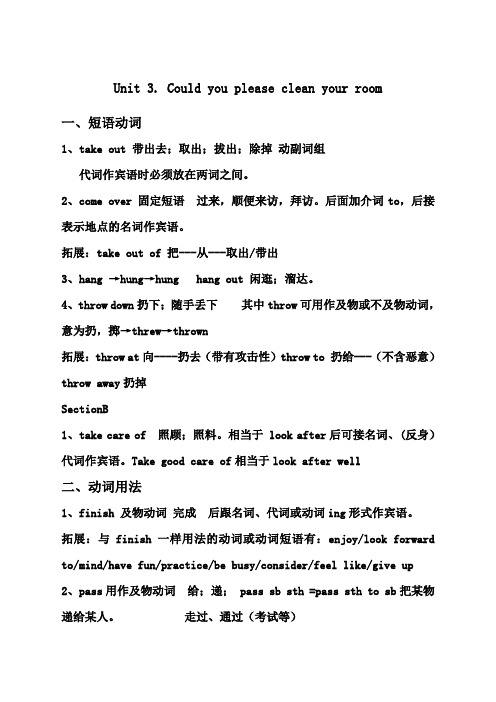
Unit 3. Could you please clean your room一、短语动词1、take out 带出去;取出;拔出;除掉动副词组代词作宾语时必须放在两词之间。
2、come over 固定短语过来,顺便来访,拜访。
后面加介词to,后接表示地点的名词作宾语。
拓展:take out of 把---从---取出/带出3、hang →hung→hung hang out 闲逛;溜达。
4、throw down扔下;随手丢下其中throw可用作及物或不及物动词,意为扔,掷→threw→thrown拓展:throw at向----扔去(带有攻击性)throw to 扔给---(不含恶意)throw away扔掉SectionB1、take care of 照顾;照料。
相当于 look after后可接名词、(反身)代词作宾语。
Take good care of相当于look after well二、动词用法1、finish 及物动词完成后跟名词、代词或动词ing形式作宾语。
拓展:与finish一样用法的动词或动词短语有:enjoy/look forward to/mind/have fun/practice/be busy/consider/feel like/give up2、pass用作及物动词给;递; pass sb sth =pass sth to sb把某物递给某人。
走过、通过(考试等)作不及物动词,(时间)过去,流逝3、borrow sth from sb向某人借某物。
非延续性动词Lend(lent;lent) sb sth=lend sth to sb借给某人某物。
非延续性动词Keep 由“保存”引申为“借”,延续性动词,可与时间段连用。
四川-----Excuse me,can I_____your pen-----sorry,I have_____it to Bob.A.borrow;lend ;borrowed ;borrowed ;lent4、hate及物动词厌恶;讨厌,表示一种感情或心理状态,不能用于进行时态。
七年级上册英语第三单元知识点

七年级上册英语第三单元知识点一、重点短语1. a letter to sb. 一封给某人的信2. on the desk 在桌子上3. next to the desk 在桌子旁边4. under the desk 在桌子下面5. on the chair 在椅子上6. in the drawer 在抽屉里7. please do sth 请做某事8. in the door 在门里面9. on the bed 在床上10. behind the door 在门后面11. in the room 在房间里12. in the classroom 在教室里13. open the door 开门14. behind the chair 在椅子后面15. on the wall 在墙上二、重点句型1. The keys are on the table.(钥匙在桌子上。
)2. The ruler is in the pencil box.(尺子在铅笔盒里。
)3. The cup is under the chair.(杯子在椅子下。
)4. The backpack is on the chair.(背包在椅子上。
)5. Where is my pencil box?(我的铅笔盒在哪?)6. It’s under the desk.(在桌子下。
)7. Where is your backpack?(你的背包在哪?)8. It’s on the chair.(在椅子上。
)9. Please open the door,please.(请打开门。
)10. Can you bring some things to school?(你能带一些东西到学校来吗?)三、重点语法1. 介词的用法:in/on/under/behind/next to等。
(1)in 表示在某一物体内部或在某一时间段内。
如:in the room,in the morning。
初一英语第三单元知识点笔记

初一英语第三单元知识点笔记一、词汇和短语1.welcome to + 地点:表示欢迎来到某个地方2.where + be 动词的一般现在时:询问某物或某人在哪里3.have got/ has got:表示“有”的意思,相当于have/ has4.price tag:价格标签5.department:百货公司6.video:录像,录影7.how much + be 动词的一般现在时:询问某物或某人的价格8.kilogram:千克,公斤9.the price of + 名词:表示某物的价格e on:加油,来吧二、重点句型1.Welcome to the department store. 欢迎来到百货公司。
2.The price of the shirt is 20 yuan. 这件衬衫的价格是20元。
3.The department store has got everything you need. 这家百货公司有你需要的一切。
4.They have got all kinds of things in the department store.他们在百货公司里有各种各样的东西。
5.Where is the department store? 百货公司在哪里?6.It's on the ground floor of the shopping center. 它在购物中心的一楼。
7.How much is the blue shirt? 这件蓝色衬衫多少钱?8.It's 20 yuan a kilogram. 每公斤20元。
9.I want to buy a T-shirt for my son. 我想给我儿子买一件T恤衫。
10.Can you help me find the size for my son? 你能帮我找到适合我儿子的尺码吗?三、语法重点1.掌握“where + be 动词的一般现在时”的用法,用来询问某物或某人在哪里。
九年级上册英语第3单元笔记

九年级上册英语第3单元笔记一、重点短语ed to do 过去常常做某事2.be used to doing sth 习惯于做某事3.be used to do 被用来做某事4.go to the movies 去看电影5.watch TV 看电视6.listen to music 听音乐7.all the time 一直,总是8.on weekends 在周末9.no problem 没问题10.at the moment 此刻,目前11. a few 几个,一些12.none 一个也没有13.too many 太多14.have free time 有空闲时间15.the day after tomorrow 后天16.on the other hand 另一方面17.have fun doing sth 做某事开心/愉快18.spend time doing sth 花时间做某事19.keep healthy 保持健康20.get a letter from sb 收到某人的来信二、重点句型1.What do you use to do?你过去常常用来做什么?2.I used to go to the movies with my friends on weekends. 我过去常常在周末和朋友一起去看电影。
3.I am used to getting up early now. 现在我已经习惯了早起。
4.I don't watch TV every night. 我每晚都不看电视。
5.I listen to music instead. 我改听音乐了。
6.None of my friends smoke!我的朋友没有一个吸烟!7.I will have free time tomorrow. 我明天有空闲时间。
8.It’s easy for me to get t o the post office,but it’s hard for her to get there. 对我来说去邮局很容易,但是对她来说去那里很难。
九年级英语第三单元知识点
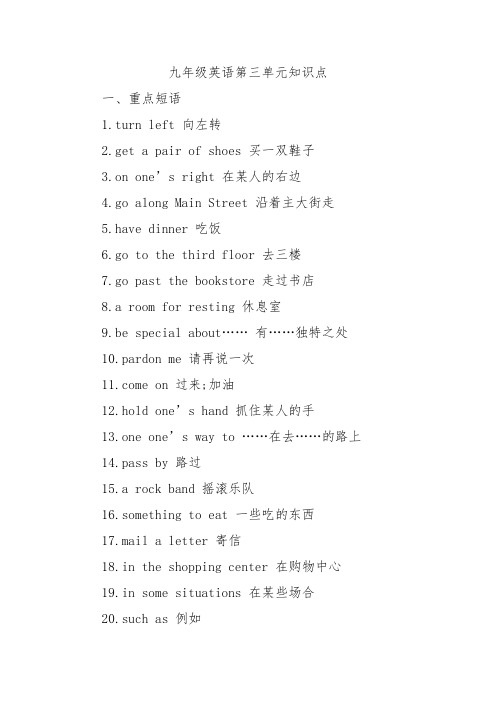
九年级英语第三单元知识点一、重点短语1.turn left 向左转2.get a pair of shoes 买一双鞋子3.on one’s right 在某人的右边4.go along Main Street 沿着主大街走5.have dinner 吃饭6.go to the third floor 去三楼7.go past the bookstore 走过书店8.a room for resting 休息室9.be special about……有……独特之处10.pardon me 请再说一次e on 过来;加油12.hold one’s hand 抓住某人的手13.one one’s way to ……在去……的路上14.pass by 路过15.a rock band 摇滚乐队16.something to eat 一些吃的东西17.mail a letter 寄信18.in the shopping center 在购物中心19.in some situations 在某些场合20.such as 例如21.lead in to a request 引人一个请求e proper language 使用合适的语言23.park one’s car 停车24.an underground parking lot地下停车库25.change money 换钱26.the way to ……去……的路27.travel to……28.thank……for doing…….为……感谢某人29.look forward to…….期盼……30.meet……for the first time 第一次见到某人31.in a rush to do……仓促地做某事32.be convenient to do……做某事很方便二、重点句型1.not……until……You never know until you try something.凡事只有亲身经历了才能了解。
八下英语第三单元知识梳理

八下英语第三单元知识梳理以下是八下英语第三单元的知识梳理:一、重点短语:take a photo 拍照in the corner 在角落里on the right 在右边on the left 在左边in front of 在……前面behind 在后面next to 紧挨着turn left/right 左转/右转go straight 直走cross the road 穿过马路wait for a while 等一会儿look for a while 看一会儿二、重点句型:1、Excuse me, where is the nearest post office? 请问,最近的邮局在哪里?2、Could you tell me the way to the train station? 你能告诉我去火车站的路吗?3、Go along the street and turn left at the first crossing. 沿着这条街走,在第一个十字路口左转。
4、It's next to the bank. 它挨着银行。
三、重点语法:1、问路和指路的表达方式。
例如:where is the nearest post office? how can I get to the train station?等等。
2、表示位置的介词,如:in, on, next to, behind, in front of等等。
四、重点单词:这个单元的单词包括各种地点名词,如bank,post office,library,train station等等,以及表示位置和方向的介词和短语。
最新完整人教版五年级英语上册第三单元知识点归纳总结及作文范文
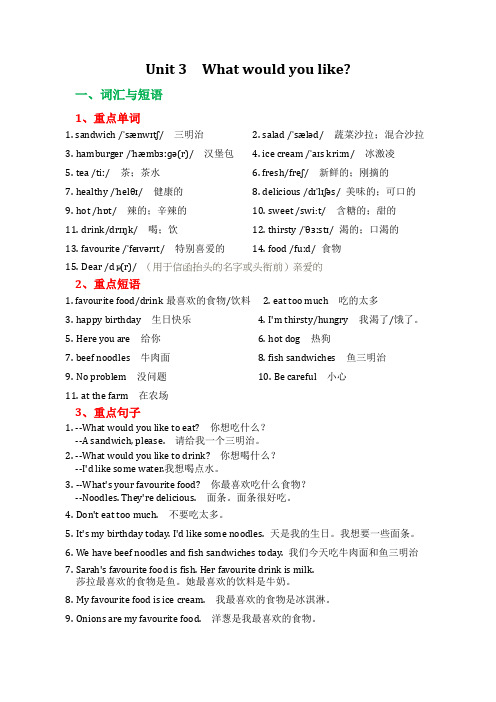
Unit 3 What would you like?一、词汇与短语1、重点单词1. sandwich /ˈsænwɪtʃ/ 三明治2.salad /ˈsæləd/ 蔬菜沙拉;混合沙拉3.hamburger /ˈhæmbɜːɡə(r)/ 汉堡包4.ice cream /ˈaɪs kriːm/ 冰激凌5.tea /tiː/ 茶;茶水6.fresh/freʃ/ 新鲜的;刚摘的7.healthy /ˈhelθɪ/ 健康的8.delicious /dɪˈlɪʃəs/ 美味的;可口的9.hot /hɒt/ 辣的;辛辣的10.sweet /swi:t/ 含糖的;甜的11.drink/drɪŋk/ 喝;饮12.thirsty /ˈθɜːstɪ/ 渴的;口渴的13.favourite /ˈfeɪvərɪt/ 特别喜爱的14.food /fuːd/ 食物15.Dear /dɪə(r)/ (用于信函抬头的名字或头衔前)亲爱的2、重点短语1. favourite food/drink最喜欢的食物/饮料2.eat too much 吃的太多3.happy birthday 生日快乐4.I'm thirsty/hungry 我渴了/饿了。
5.Here you are 给你6.hot dog 热狗7.beef noodles 牛肉面8.fish sandwiches 鱼三明治9.No problem 没问题10.Be careful 小心11.at the farm 在农场3、重点句子1. --What would you like to eat? 你想吃什么?--A sandwich, please. 请给我一个三明治。
2. --What would you like to drink? 你想喝什么?--I'd like some water.我想喝点水。
3.--What's your favourite food? 你最喜欢吃什么食物?--Noodles. They're delicious. 面条。
- 1、下载文档前请自行甄别文档内容的完整性,平台不提供额外的编辑、内容补充、找答案等附加服务。
- 2、"仅部分预览"的文档,不可在线预览部分如存在完整性等问题,可反馈申请退款(可完整预览的文档不适用该条件!)。
- 3、如文档侵犯您的权益,请联系客服反馈,我们会尽快为您处理(人工客服工作时间:9:00-18:30)。
Unit3 短语、词汇、知识点梳理
一、第三单元短语
1.节日快乐holiday fun
2.回到学校come back to school
3.国庆假日之后after the National Day holiday
4.放假你去了哪儿?Where did you go for the holiday?
5.打电话给你call you
6.在家at home
7.去上海go to Shanghai
8.拜访我的阿姨visit my aunt
9.去外滩go to the Bund
10.参观上海博物馆visit the Shanghai Museum
11.看见许多有趣的事see many interesting things
12.你的假日怎么样?How was your holiday?
13.有趣的事great fun
14.我们的家人our family
15.去农场go to a farm
16.在星星湖边near Star Lake
17.摘了一些橘子pick some oranges
18.去钓鱼go fishing
19.钓了一条大鱼catch a big fish
20.想要把鱼给你want to give you the fish
21.长城Great Wall
22.故宫Palace Museum
23.颐和园Summer Palace
24.天安门广场Tian’anmen Square
25.谈论你的旅游经历talk about your travel experiences
26.为我摘只橘子pick an orange for me
27.想要树上的一只橘子want an orange from the tree
28.想要海里的一条鱼want a fish from the sea
29.三个主要的学校假日three main school holidays
30.在英国in the UK
31.复活节假期the Easter holiday
32.暑假the summer holiday
33.圣诞假期the Christmas holiday
34.该吃晚饭了。
It is time for dinner.
35.回家晚了come home late
36.举行一场时装秀have a fashion show
37.喜爱漂亮的衣服love beautiful clothes
38.对时装表演很兴奋be excited about/at the fashion show (be excited by
被……而激动;be excited for 因/为……而激动;be excited at 与be excited about常互用,后+v-ing. )
39.喜爱时装秀love fashion shows
40.多么有趣!What great fun!
41.穿一件纸T恤和纸短裤wear a paper T-shirt and paper shorts
42.询问某人有关某事ask sb. about sth.
43.穿着纸衣服wear paper clothes
44.穿了许多瓶子wear a lot of bottles
45.打听有关表演的事ask about the show
46.进展顺利go well
47.起初很完美。
It was wonderful at first.
48.大雨heavy rain
49.太糟糕了too bad
50.汽车博物馆the Car Museum
51.许多很酷的小汽车many cool cars
52.去电影院go to the cinema
53.看一部新电影see/watch a new film
54.举行一个生日派对have a birthday party
55.遇见很多朋友meet many friends
56.洗车wash his car
57.用升/降调use rising/falling intonation
二、第三单元词汇
1.假日,假期holiday
2.国庆节National Day
3.打电话给call
4.(上海)外滩Bund
5.上海博物馆Shanghai Museum
6.星星star
7.长城Great Wall
8.故宫Palace Museum
9.颐和园Summer Palace
10.天安门广场Tian’anmen Square
11.时装表演,时装秀fashion show
12.激动的,兴奋的excited
13.纸paper
14.问ask
15.瓶子bottle
16.进展顺利go well
17.开始,最初at first
18.大雨heavy rain
三、第三单元知识点梳理
1、一般过去时的各种句型转换:
(1)一般疑问句及其肯定和否定回答:e.g.: A: Did you catch any fish?
B: Yes, I did./No, I didn’t.
(2)由Where, What和Why 引导的特殊疑问句的问答:
A: Where did you go for the holiday? B: I went to a farm.(重在回答地点)
A: What did you do for the holiday? B:I visited the Shanghai Museum.(重在事情。
) A:Why did you call me? B: Because I wanted to give you the fish. (重在陈述原因。
)
针对上述的三种句型的回答,也可以采用逆向的对画线部分提问:
a : I called you because I wanted to give you the fish?(对画线部分提问)
Why did you call me?
(3)由How引导的特殊疑问句的问答:
A:How was your holiday? B: It was great fun.
2、the的用法:本单元重在讲述travel experiences(旅游经历),旅游景点都是唯一的,作为唯一性的名词前均须加上the。
如:the Bund, the Shanghai Museum, the Great Wall, the Palace Museum, the Summer Palace, the Tian’anmen Square.
3、Use falling intonation(使用降调): 这一单元采用降调来读Sound time, 要指导好学生读好降调。
4、有关holiday: 本单元有3个板块,即Story time, Fun time, Checkout time, 都谈论了the National Day holiday. 课后的写话练习也要求围绕这个话题展开。
而Culture time谈论的是英国的三个主要学校假期:the Easter holiday, the summer holiday, the Christmas holiday. 可以在课外补充有关这三大节日人们经常做的事,操练本课的句型。
5、excited 后接不同介词的意思对比:
be excited by 被……而激动;
be excited for 因/为……而激动;
be excited at 与be excited about常互用,后+v-ing. )
6、有关动词过去式的变化:
不规则动词有:(前一单元出现过的不再重复。
)
规则动词有:(前一单元出现过的不再重复。
)
7、ask…about和ask about的区别:ask…about…表示问某人有关某事,ask about…表示打听。
8、介词的用法:
after the National Day holiday at home,
near Star Lake talk about,
pick an orange for me want an orange from the tree,
in the UK It is time for dinner.
ask sb. about sth. ask about the show
at first be excited about
9、固定短语的用法:
节日快乐holiday fun 打听ask about
进展顺利go well 起初at first
大雨heavy rain。
